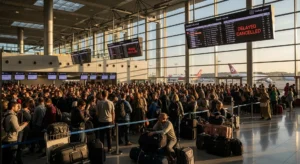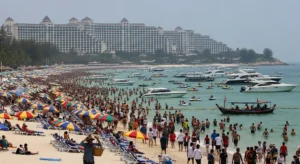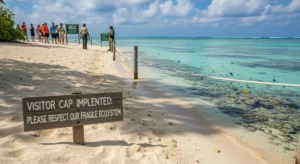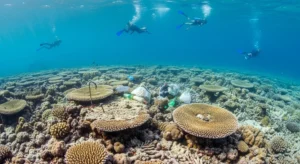Islands have always been dream destinations — crystal-clear waters, unique cultures, and natural beauty unlike anywhere else. Yet in recent years, the rise of overtourism in island travel has become a pressing issue. While tourism brings economic opportunity, too much of it can overwhelm fragile ecosystems, put pressure on infrastructure, and disrupt local life. In 2025, as global travel demand rebounds, it’s time to take a closer look at how overtourism is reshaping island getaways — and what travelers can do to make their journeys more responsible.
What Is Overtourism?

Overtourism occurs when the number of visitors to a destination exceeds what the local environment, infrastructure, and community can handle. Unlike simple “popularity,” overtourism brings negative impacts, such as environmental degradation, overcrowding, inflated costs of living, and loss of cultural authenticity. The United Nations World Tourism Organization (UNWTO) defines overtourism as the tipping point where tourism threatens the quality of life for residents and the quality of experiences for visitors.
Why Islands Are Especially Vulnerable
Islands are particularly sensitive to overtourism for several reasons:
- Limited Land and Resources: Small islands have finite water, energy, and food supplies.
- Fragile Ecosystems: Coral reefs, mangroves, and endemic species are easily disrupted.
- Economic Dependence: Many islands rely heavily on tourism, making it hard to control growth.
- Transport Bottlenecks: Airports, ports, and ferries can become overwhelmed during peak seasons.
These pressures make islands both prime attractions and fragile spaces, requiring careful management and traveler awareness.
Examples of Overtourism in Island Destinations
Several island destinations highlight the challenge:
- Maya Bay, Thailand: Once famous from the movie *The Beach*, Maya Bay was closed in 2018 due to environmental destruction from millions of visitors. It has since reopened with strict rules limiting daily visitors.
- Santorini, Greece: Cruise ship tourism brings more daily visitors than the island can support, leading to overcrowding in villages and strain on infrastructure.
- Hawai‘i: Rising tourist numbers have raised costs of living for residents, while natural areas face erosion and stress from overuse.
- Bali, Indonesia: Not an island chain but a single island destination where rapid tourism growth has impacted water supply, waste management, and local culture.
Impacts on Local Communities
For island residents, overtourism can feel like a double-edged sword. While it provides jobs and economic growth, it can also cause:
- Rising Housing Prices: Local families often find themselves priced out as properties become vacation rentals.
- Loss of Cultural Identity: Traditional customs may be commercialized or altered to fit tourist expectations.
- Traffic & Congestion: Roads and ports become clogged during peak travel seasons.
This is why many residents and activists push for more sustainable tourism practices, focusing on balance rather than volume.
Environmental Consequences
Islands often host delicate ecosystems, and overtourism poses serious risks:
- Coral reefs damaged by over-snorkeling and careless anchoring.
- Plastic and waste buildup overwhelming limited disposal systems.
- Wildlife disturbances — sea turtles, seabirds, and marine mammals disrupted by boat traffic and human activity.
- Freshwater shortages as resorts outcompete locals for limited supplies.
These impacts don’t just harm nature — they reduce the very beauty that draws visitors in the first place. Protecting these ecosystems is essential to preserving island destinations for the future.
How Travelers Can Help: Responsible Island Travel
Tourists play a crucial role in combating overtourism. Here are practical steps you can take:
- Travel Off-Peak: Visit islands during shoulder seasons to ease crowding and support year-round economies.
- Choose Eco-Friendly Stays: Support resorts and guesthouses that practice water conservation, renewable energy, and waste reduction. See our tips in Sustainable Escapes.
- Limit Cruise Tourism: Cruises often bring thousands of visitors at once. Consider smaller ships or staying longer on islands to deepen your impact.
- Respect Local Culture: Learn a few phrases, follow dress codes, and participate in authentic cultural experiences rather than staged attractions.
- Reduce Waste: Bring reusable bottles, bags, and cutlery to avoid single-use plastics, a major issue for small islands.
Responsible Tour Operators
Some tour operators and destinations are taking proactive steps to reduce overtourism. Initiatives include:
- Implementing visitor caps for popular attractions.
- Encouraging lengthier stays instead of day trips.
- Investing in conservation and community projects funded by tourism taxes.
The Responsible Travel organization highlights travel companies and island resorts committed to sustainability, offering a great resource for mindful planning.
Islands Leading the Way in Sustainable Tourism
Some islands are setting positive examples by embracing sustainability:
- Palau: The island nation requires visitors to sign an environmental pledge upon arrival.
- Galápagos Islands: Strict visitor limits and guided tours ensure conservation of wildlife and ecosystems.
- Dominica: Branded itself as the “Nature Island” and committed to becoming the world’s first climate-resilient nation with eco-tourism at its core.
These examples show that it’s possible to welcome visitors while protecting culture and nature — models worth supporting and replicating elsewhere.
Balancing Wanderlust with Responsibility
Traveling responsibly doesn’t mean giving up your dream island vacation. Instead, it means making conscious choices that balance your enjoyment with respect for the destination. Think of it as a partnership — you get to enjoy paradise while helping protect it for future generations.
Whether you’re planning a cultural journey, a wellness retreat, or an adventurous escape, traveling responsibly adds meaning and value to your experience. For more inspiration, explore our guides on Wellness Travel and Cultural Journeys.
Conclusion
Overtourism is changing the face of island travel, but it doesn’t have to be the end of paradise. By understanding the challenges and committing to more responsible practices, travelers can be part of the solution. Support local communities, protect ecosystems, and choose experiences that enrich both you and the destination. Together, we can ensure that the islands we love remain vibrant, authentic, and breathtaking for years to come.



